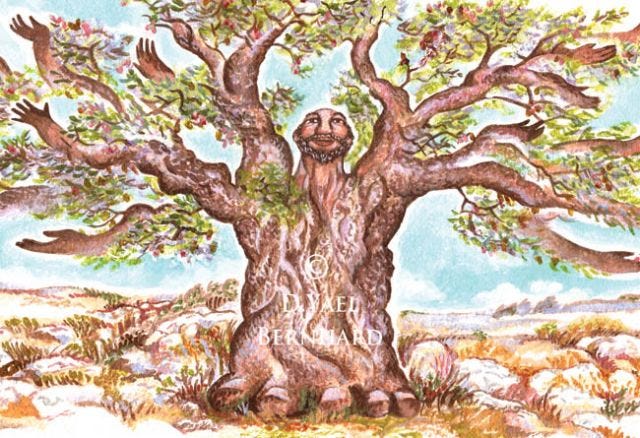Image of the Week: Hillel's Argument

© D. Yael Bernhard
Hillel the Elder is considered to be one of the great sages of the Second Temple period in Judea. Born in Babylon at the end of the first century BCE, he was known as Zaken ("the Elder"), a title conferred upon men of great honor and authority. He was most active between 10 BCE and 10 CE, as a teacher of not only ethics and religion, but also in matters of civil law and economics. According to Encyclopedia Judaica, Hillel was "a man of great humility, who in his pursuit of peace was even prepared to depart from the truth . . . To this end he scrupulously avoided anger and pedantry, and was prepared to reply to all questions, even those obviously calculated to vex him."
Hillel dedicated his life to bringing people closer to Torah, and is famous for encapsulating the vast teachings of Jewish scripture allegedly while standing on one foot. When I heard this story – not realizing he had reduced his teaching to a single sentence ("What is hateful to you, do not do to others") – my first thought was that Hillel must have had very good balance! Standing on one foot is something I've practiced for years in a series of balancing yoga postures. Trust me, it's not easy.
My second thought was of a very broad foot that one could stand on securely for a long time. It reminded me of an olive tree I had seen in Israel, several centuries old, with gnarly, toe-like roots. What began as a rather absurd image of a rooted foot grew into this surreal illustration of the ancient sage. Hillel's skyward gaze is filled with divine inspiration. His open arms symbolize his expansive mind, and his willingness to hear his opponents' point of view – a practice he diligently taught his students. He believed in "an argument for the sake of Heaven" – machloket l'shem shamayim – that is, a cause with a constructive outcome, not just a victory for one side. Hillel is known for such pithy phrases as "He who magnifies his name destroys it" and "He who does not increase his knowledge decreases it." To embrace such ideas is to build a mindset as unique and enduring as the curved and twisted forms of a very old olive tree.
Hillel's legacy is honored on the Jewish Day of Constructive Conflict, a lesser-known event that takes place on the 9th of Adar on the Hebrew calendar. The day commemorates a legendary debate that took place between the school of Hillel and that of his arch-opponent, Shammai. Exactly what happened on that day is a subject of much speculation. In a "house of study" such as Hillel's, debate itself took on a whole new character, helping to shape a tradition of Jewish learning that still exists today.
It seems like we, too, could use a "Day of Constructive Conflict," as angry protests are sprouting up like mushrooms all over our country. Our foremost issues have changed since the time of Hillel, but our human foibles and frailties haven't. Can we, two thousand years later, consider the "other's" point of view in our arguments? Now, as then, it takes an expansive mind to transcend the polarity of conflict.
Hillel's Argument is painted in acrylic on handmade watercolor paper. It measures 28" wide, and is for sale. The above image is slightly cropped; you can see the whole painting in The Jewish Eye 5781/2021 Calendar of Art, where the it appears for the month of February.

The Jewish Eye 5781/2021 Calendar of Art is available in my webstore ($18 including shipping) and on Amazon ($18 prime). If you're local, you can also find it at The Tender Land gift shop in Phoenicia, NY. Please consider supporting my art by buying a calendar!
A good week to all . . .

D Yael Bernhard



